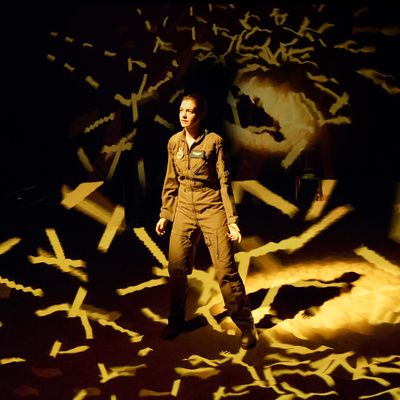
The question of how to make Americans listen to things they may not want to hear, especially from the stage, is smartly answered by the Public Theater’s production of George Brant’s Grounded. On its own merits, this cautionary tale about our increasing reliance on drone warfare might too easily be ignored, as there isn’t much exterior drama to it. Rather, an unnamed Air Force major simply delivers an 80-minute monologue recounting her downward trajectory (as she sees it) from fighter pilot to operator of UAVs (unmanned aerial vehicles) after an unplanned pregnancy grounds her. Transferred from forward operating positions in Iraq to Creech AFB in the Mojave — from one desert to another — she experiences a moral trade-off that eventually begins to undo her. Yes, she gets to be with her husband and daughter after her 12-hour shift staring at screens each day, but the act of killing becomes so remote as to almost deprive it of meaning. We are meant to understand that the blank check we offer the military in order to protect us is just a more abstract version of the same trade-off.
The combination of Oscar-winning movie star Anne Hathaway and buzz-magnet director Julie Taymor is sure to draw more attention to the timely subject than have any of the play’s three dozen productions around the world since 2013, including a well-reviewed, bare-bones stop in New York last year. Taymor’s direction (to get this out of the way) is disciplined and phenomenal, which is partly a compliment and partly just a description. The audience absorbs the story as a series of phenomena: amazing things happening before its eyes and ears. As designed by Riccardo Hernandez, the set consists of an expanse of rippling sand on the floor of the Anspacher Theater and a reflective black wall behind it; these become the screens on which projection designer Peter Nigrini and lighting designer Christopher Akerlind fill out the inner life of the pilot. This inner life, as painted with the swift, vertiginous — and familiar — strokes of a video game, further implicates ordinary Americans in the moral morass, even when depicting seemingly neutral events like ultrasounds and visits to the mall. It is at the mall, for instance, that the pilot, beginning to question the fairness of her mission, freaks out upon seeing a JCPenney security camera watching her and her daughter from its perch. The play seems to be asking: Are we not all deconditioned to the dehumanization of remote surveillance? Is war just another living-room pastime? (The drone pilots, we are told, spend their shifts in Barcaloungers.)
These questions surely deserve a forum. As Oskar Eustis, the Public’s artistic director, writes in a program note, “Grounded is interested in the psychological impact on the pilots who command drones, but what makes the play important and powerful is the way [Brand’s] Pilot stands in for all of us.” The first part is certainly true; Hathaway gives a credible and wrenching performance of a woman losing it. She’s also enough of an entertainer to vary the monologue, much of it written in somewhat purple prose-poetry, with casual moments and, where possible, dustings of sly humor. You can’t help feeling for her. But the second part of Eustis’s encomium is more problematic. Though the playwright clearly does mean to have the pilot stand in for all of us, the substitution is less than convincing, at least as theater. For one thing, the pilot apparently has emotional problems that predate her work with drones. No more so than any of her male colleagues, presumably, she shows evidence of a kind of induced narcissistic disorder that goes into overdrive when she’s grounded, no longer the “top shit,” and then demoted to the Chair Force, as drone duty is called. If her inherent bravado is meant to reflect the American psyche — our supposed cowboy mentality in world affairs — the comparison is unearned. And a hollow peroration tagged on to the end, directly addressing in second person and Biblical cadence the audience’s complicity, does not redeem as theater an idea that was never dramatized.
What I do find successful in Grounded, aside from the top-notch if eventually wearisome production, is its chilling portrait of future war as just another job scrubbed of its pernicious effects. (The pilot’s husband works as a dealer at the Luxor Hotel & Casino, “cheating people” in another desert’s pyramid.) Its larger implications, to which I’m not unsympathetic, need more thought. As it stands, Grounded seems to set up a false opposition; it asks us to be nostalgic for older forms of decimation. “It would be a different book, The Odyssey, if Odysseus came home every day,” the pilot says. I’m not sure it would be a darker one.
Grounded is at the Public Theater through May 24.

